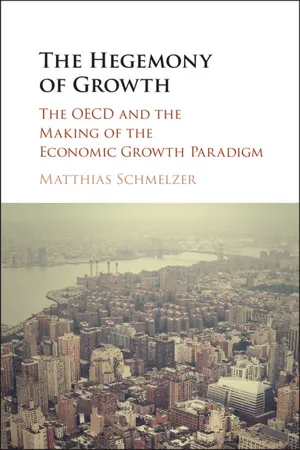
The Hegemony of Growth
The OECD and the Making of the Economic Growth Paradigm
- English
- PDF
- Available on iOS & Android
About this book
In modern society, economic growth is considered to be the primary goal pursued through policymaking. But when and how did this perception become widely adopted among social scientists, politicians and the general public? Focusing on the OECD, one of the least understood international organisations, Schmelzer offers the first transnational study to chart the history of growth discourses. He reveals how the pursuit of GDP growth emerged as a societal goal and the ways in which the methods employed to measure, model and prescribe growth resulted in statistical standards, international policy frameworks and widely accepted norms. Setting his analysis within the context of capitalist development, post-war reconstruction, the Cold War, decolonization, and industrial crisis, The Hegemony of Growth sheds new light on the continuous reshaping of the growth paradigm up to the neoliberal age and adds historical depth to current debates on climate change, inequality and the limits to growth.
Frequently asked questions
- Essential is ideal for learners and professionals who enjoy exploring a wide range of subjects. Access the Essential Library with 800,000+ trusted titles and best-sellers across business, personal growth, and the humanities. Includes unlimited reading time and Standard Read Aloud voice.
- Complete: Perfect for advanced learners and researchers needing full, unrestricted access. Unlock 1.4M+ books across hundreds of subjects, including academic and specialized titles. The Complete Plan also includes advanced features like Premium Read Aloud and Research Assistant.
Please note we cannot support devices running on iOS 13 and Android 7 or earlier. Learn more about using the app.
Information
Table of contents
- Cover
- Half-title page
- Title page
- Copyright page
- Contents
- Figures and Tables
- Acknowledgments
- Abbreviations
- Introduction
- Setting the stage: A historical introduction to the OECD
- Part I Paradigm in the making: The emergence of economic growth as the key economic policy norm (1948–1959)
- Part II Paradigm at work: A “temple of growth for industrialized countries” in action (1960–1968)
- Part III Paradigm in discussion: The “problems of modern society,” environment, and welfare (1969–1974)
- Epilogue: Paradigm remade (1975–2011)
- Conclusion: Provincializing growth
- Archival sources and select bibliography
- Index